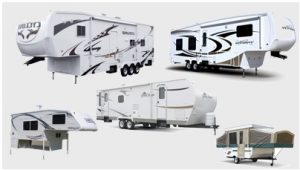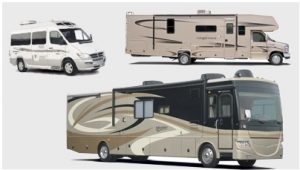 Non Motorized RVs Non-Motorized or Towable RVs are RVs (Recreational Vehicles) that do NOT have a motor as a part of the RV.
Non Motorized RVs Non-Motorized or Towable RVs are RVs (Recreational Vehicles) that do NOT have a motor as a part of the RV.
This RV type always requires another vehicle to tow the RV.
Towable RV sizes exist in a small enough size such that a small car like a Honda can tow it, all the way up to an RV so large it requires a Ford F350 Diesel or larger.
By far... this is the most popular and most purchased variant of RV that is manufactured today as measured by the number of units sold.
 The Motorhome – The Motorized RV Type Far and above, this RV type is the type most recognized as an RV.
The Motorhome – The Motorized RV Type Far and above, this RV type is the type most recognized as an RV.
Whenever you watch movies, you will see the typical Class A RV depicted.
All of these RV types have an engine installed in the RV and requires no other vehicle to move the RV.
As a special note, you will see that most serious RVers who have motorhomes, also tow a small car as large RVs are impractical for exploring and navigating as a daily vehicle.
Motorized vs. Non-Motorized RVs: Key Differences and Decision Factors
When choosing a recreational vehicle (RV), understanding the two main categories—motorized and non-motorized (towable)—is crucial. Each RV type comes with its own unique advantages and trade-offs that can significantly affect cost, flexibility, maintenance, and day-to-day functionality. Making an informed choice between these two categories depends on your travel style, budget, and personal preferences.
Motorized RVs: Pros, Cons, and Who They’re Best For
Motorized RVs are self-contained, meaning they have an engine and can be driven as an all-in-one vehicle. They range from compact Class B camper vans to spacious Class A motorhomes, with Class C models sitting in between.
Pros of Motorized RVs:
- Convenience: Because they’re self-propelled, motorized RVs don’t require a separate vehicle for towing, making them easier to maneuver and set up at campsites.
- All-in-One Experience: With all your living amenities and transportation in one vehicle, motorized RVs offer a seamless travel experience, ideal for those who want a quick setup.
- Compact and Versatile Options: From large Class A models to smaller Class B camper vans, motorized RVs come in various sizes, offering options for couples, families, or solo travelers.
Cons of Motorized RVs:
- Higher Upfront Costs: Motorized RVs tend to have higher purchase prices due to their built-in engines and complex systems.
- Maintenance Complexity: A motorized RV has all the mechanical components of both an engine and a living space, which can lead to higher maintenance and repair costs.
- Mobility Limitations: Once parked, the RV serves as your primary vehicle, which may be inconvenient for running errands or exploring nearby attractions unless you tow a separate, smaller vehicle (a “toad”) behind it.
Best For: Motorized RVs are ideal for travelers who prioritize convenience and want a vehicle that combines transportation and accommodations. They’re also great for people who want the flexibility to quickly hit the road without needing to set up a separate towing system.
Non-Motorized (Towable) RVs: Pros, Cons, and Who They’re Best For
Non-motorized RVs, or towables, include travel trailers, fifth wheels, and other types of campers that are designed to be towed by a separate vehicle, such as a pickup truck, SUV, or even a small car (for very lightweight models).
Pros of Non-Motorized RVs:
- Cost Savings on Vehicle Purchases: Since non-motorized RVs don’t have their own engines, you won’t be paying for the cost of a second engine. If you already own a suitable tow vehicle (such as a pickup or SUV), this can save you considerable money.
- Lower Maintenance Costs: Without an engine or drivetrain, non-motorized RVs generally have lower maintenance costs and fewer mechanical issues to worry about.
- Separate “Home Base” and Transportation: Once the RV is parked at a campsite, your tow vehicle is free to use for day trips, grocery runs, or exploring nearby areas without needing to pack up the RV each time.
Cons of Non-Motorized RVs:
- Additional Setup: Towing and setting up a non-motorized RV at a campsite may require more time and effort compared to a motorized RV.
- Vehicle Towing Requirements: You’ll need a capable tow vehicle, especially for larger travel trailers or fifth wheels. This may involve purchasing a specific type of vehicle, which adds to the initial investment.
- Driving and Parking Challenges: Towing a large trailer can be challenging, especially for new RVers, and maneuvering a large trailer in tight areas may be difficult.
Best For: Non-motorized RVs are great for campers who already own a tow vehicle, prefer having a separate car for local travel, and want to minimize maintenance costs. They’re also popular with those who enjoy extended stays at campgrounds and want the freedom to explore surrounding areas without moving their entire setup.
Key Decision Factors When Choosing Between Motorized and Non-Motorized RVs
- Budget
Motorized RVs usually have a higher upfront cost due to the built-in engine and more complex systems, making non-motorized RVs a budget-friendly option. Additionally, maintenance costs tend to be lower with towable RVs, since they lack the mechanical components of an engine. - Existing Vehicle
If you already own a capable tow vehicle, a non-motorized RV can be a more economical choice. However, if you don’t have a suitable vehicle or prefer to avoid towing, a motorized RV eliminates the need for a second vehicle purchase. - Travel Style
For travelers who want a seamless travel experience with minimal setup at campsites, a motorized RV can be more convenient. On the other hand, if you prefer to set up a “home base” and use a separate vehicle for exploring, a towable may better suit your travel preferences. - Mobility and Flexibility
One of the biggest factors when choosing between motorized and non-motorized RVs is how you plan to get around once your RV is parked. Motorized RVs require either towing a separate vehicle for local travel or using the RV itself, which may be cumbersome. With a towable RV, your tow vehicle is free for convenient local excursions. - Comfort with Towing vs. Driving an RV
Towing a travel trailer or fifth wheel requires experience and comfort with towing and parking. If you prefer a single-unit vehicle or find towing daunting, a motorized RV may be more appealing.
Which Type of RV is Right for You?
Ultimately, the choice between a motorized and non-motorized RV depends on your lifestyle, budget, and travel preferences. Here’s a quick summary to help you decide:
- Motorized RVs: Best for those who prioritize ease of setup, enjoy a compact, all-in-one experience, and don’t mind the additional cost for convenience.
- Non-Motorized RVs: Ideal for travelers who already own a tow vehicle, prefer lower maintenance costs, and want the flexibility of having a separate vehicle for local travel.
Choosing the right RV type can enhance your travel experience, making it easier to enjoy every moment on the road and at your destination. Whether you go motorized or towable, each offers its own distinct benefits that align with different types of RV lifestyles.
Notes on RV Axles and weights
Most RVs now have 4 wheels on two axles. The smallest campers form a class called camping trailers and they have a single axle, but most have 4 wheels. There are a few “beasts” that have 6 wheels and 3 axles – they usually fall into classes of RVs called Toy Haulers and Luxury Fifth Wheels. Almost without exception, the 6 wheels beasts are fifth wheels due to the many benefits of the fifth wheel connection.
The most important thing about the wheels that you can think about isn’t really the wheels, but instead, is how the wheels and axles translate into the hauling capacities of the RV.
For example, if you look at the GVWR and the UVW you need to think LONG AND HARD about how much stuff you will put inside the RV. For example, if your RV has a hauling capacity of 500 pounds ( GVWR minus UVW ) and it is a fairly large RV ( perhaps longer than 26 feet ) then it will be VERY easy to exceed that weight limit with just clothes, kitchen items & supplies. If you put fresh water in the tank and you are overweight.
So the wheels are a KEY component ( actually it is the axle & support system too ) of the carrying capacity. So I’m encouraging you as a reader to focus on what you plan on putting into the RV. When you look at weight ratings for the RV, you might RECONSIDER purchasing a unit that has very little extra capacity.
One more note on weight capacity. If you exceed it, you could get a ticket. You could also have an accident as the weight ratings are designed to protect people.
Ann Whitley says
What do letters mean in winnabego Fw229tr
Marlan at Rv52 says
WF229TR is what I think the number should be. I asked Winnie if there was any meaning in the number and they said “no it is just a model designation”.
I would still think there might be some meaning. Plus trying to make something up is kind of fun.
I think the 229 is a rough size in sq foot. That would put it at a rough length of 26 foot which I think is about right.
I would peg the “W” as just a Winnebago designation. I’ll guess at the F being a front drive – as a class C.
As far as the TR, maybe Tow Rated or something like that.